Importance of Topical Authority in SEO
The importance of topical authority in SEO cannot be overstated. In today's digital landscape, the vast majority of internet users rely on search engines to find the information they are looking for. As such, the websites that rank highly in search engine results are often seen as the most credible and trustworthy sources on a given topic.
Having strong topical authority can also help a website attract more traffic from organic search. When a website consistently provides high-quality and relevant information on a particular topic, it can earn the trust of both search engines and users. This trust can translate into higher rankings in search engine results and an increase in organic traffic.
In addition to attracting more traffic, having strong topical authority can also help a website convert more visitors into customers. When a website is seen as an authority on a particular topic, it can build credibility and trust with its audience. This can lead to an increase in conversions, whether through direct sales or through other actions such as newsletter signups or social media follows. In short, demonstrating topical authority is an essential part of any successful SEO strategy.
What is Topical Authority?
Topical authority is a measure of a website's expertise and credibility in a specific topic or industry. In the context of search engine optimization (SEO), having topical authority can help improve a website's visibility and ranking in search engine results.
One way to establish topical authority is by consistently creating high-quality content related to the website's industry or topic. This content can include blog posts, articles, guides, and other forms of information that provide value to readers. The content should be well-researched and well-written, and should be updated regularly to keep it fresh and relevant.
Another way to establish topical authority is by building links from other reputable websites. This can be done through guest blogging, taking part in industry forums and discussions, and collaborating with other industry experts. By building these links, a website can show search engines that it is a trusted source of information on its topic, which can improve its ranking.
In addition to creating high-quality content and building links, having a well-designed and user-friendly website can also help establish topical authority. A website should be easy to navigate and should provide a positive user experience. This can include features such as clear and concise information, relevant and engaging images and videos, and effective calls-to-action.
Another important aspect of establishing topical authority is engaging with the website's audience. This can be done through social media, email newsletters, and other forms of outreach. By engaging with readers and responding to their questions and comments, a website can show that it is an active and engaged participant in its industry or topic.
Overall, establishing topical authority is an important part of SEO. By consistently creating high-quality content, building links, having a user-friendly website, and engaging with the audience, a website can improve its ranking and visibility in search engine results. This can help attract more traffic and potential customers to the website, and can ultimately help grow the business.
How Does Topical Authority Impact Search Engine Rankings?
Topical Authority in SEO refers to a website's credibility and expertise on a particular topic or industry. This is a key factor that search engines take into account when ranking websites in search results. In general, websites with a high level of topical authority are more likely to rank higher in search results, as they are considered to be more trustworthy and relevant to the user's query.
One way that a website can establish itself as an authority on a particular topic is by consistently producing high-quality content that is relevant and useful to its target audience. This could include blog posts, articles, videos, or other forms of content that provide valuable information and insights on the topic. Additionally, having a strong presence on social media and engaging with users on these platforms can also help to build authority, as it shows that the website is active and well-regarded in its industry.
Some common signals that search engines use to determine a website's authority on a particular topic include the number and quality of backlinks from other websites, the website's age and history, the level of engagement and activity on the website, and the level of expertise and credibility of the content and authors on the website.
Having a high level of authority on a topic can benefit a website in several ways. Firstly, it can help to improve search engine rankings and drive more organic traffic to the website. This, in turn, can lead to increased visibility and exposure for the website, which can help to build brand awareness and reputation. Additionally, having a reputation as an authority on a topic can also help to build trust and credibility with users, which can improve engagement and conversion rates on the website.
There are some potential drawbacks to focusing on building authority on a particular topic in SEO, however. For example, it can take a significant amount of time and effort to establish a website as an authority, and there is always the risk that other websites in the industry may also be competing for the same position.
Additionally, the search landscape is constantly evolving, and what may be considered an authoritative website today may not necessarily be the case in the future. To mitigate these risks, it is important for websites to regularly monitor and adapt to changes in search algorithms and trends, and to continually produce high-quality, relevant content to maintain their position as an authority on their chosen topic.
How to Establish Your Website as an Authority on a Particular Topic or Industry
Establishing a website as an authority on a particular topic or industry is an important part of search engine optimization (SEO). This process involves building credibility and expertise on a particular topic, in order to improve search engine rankings and drive more organic traffic to the website.
One way that a website can establish itself as an authority on a particular topic is by consistently producing high-quality content that is relevant and useful to its target audience. This could include blog posts, articles, videos, or other forms of content that provide valuable information and insights on the topic. A law firm performing legal SEO might publish quality sample contracts that others may use to reference a good example.
Additionally, having a strong presence on social media and engaging with users on these platforms can also help to build authority, as it shows that the website is active and well-regarded in its industry.
Another important factor in establishing authority is having a high number and quality of backlinks from other websites. Backlinks are links from other websites that point to a page on your website, and they are considered a key signal of authority by search engines. In general, the more high-quality backlinks a website has, the more credible and authoritative it is considered to be.
Other factors that can help to establish a website as an authority on a particular topic include the website's age and history, the level of engagement and activity on the website, and the level of expertise and credibility of the content and authors on the website.
Having a high level of authority on a particular topic can benefit a website in several ways. Firstly, it can help to improve search engine rankings and drive more organic traffic to the website. This, in turn, can lead to increased visibility and exposure for the website, which can help to build brand awareness and reputation. Additionally, having a reputation as an authority on a topic can also help to build trust and credibility with users, which can improve engagement and conversion rates on the website.
In order to successfully establish a website as an authority on a particular topic, it is important to have a well-defined target audience and a clear understanding of their needs and interests. This will help to ensure that the content produced is relevant and valuable to the audience, and that it is optimized for the appropriate keywords and search queries. Additionally, it is important to regularly monitor and adapt to changes in search algorithms and trends, and to continually produce high-quality, relevant content to maintain the website's position as an authority on the chosen topic.
Topic Clusters: How to Build Topical Authority
Topical authority and topic clusters are two important concepts in the world of search engine optimization (SEO). Both are designed to help improve a website's ranking on search engine results pages (SERPs), as well as to provide valuable information to visitors who land on the site.
Topical authority refers to a website's perceived level of expertise on a particular topic or set of topics. In other words, it is a measure of how well a website is perceived by search engines and users alike as an authority on a particular subject.
There are several factors that can influence a website's topical authority, including the quality and relevance of the content on the site, the number and quality of external links pointing to the site, and the overall structure and organization of the website.
To improve a website's topical authority, it is important to create high-quality, relevant content that is well-written and informative. This content should be organized into logical sections and categories, and should be easy for users to navigate and find what they are looking for.
In addition to creating high-quality content, it is also important to build up a network of external links pointing to the website. These links can come from other websites, social media profiles, and online directories, and can help to improve the site's authority and visibility on the web.
Another important concept in SEO is the use of topic clusters. These are groups of related content on a website that are organized around a specific topic or theme. For example, a website about health and fitness might have a topic cluster on weight loss, with several pages of content focused on this topic.
The use of topic clusters can help to improve a website's ranking on SERPs by providing a clear, organized structure for its content. This makes it easier for search engines to understand the website's content, and can help to improve its visibility and ranking on search engine results pages.
In addition to improving SEO, topic clusters can also provide value to visitors who land on the website. By organizing content into logical groups, visitors can easily find the information they are looking for and can navigate the website more easily.
Overall, topical authority and topic clusters are important concepts in the world of SEO. By focusing on creating high-quality, relevant content and organizing it into logical topic clusters, website owners can improve their ranking on search engine results pages and provide valuable information to their visitors.
Common Signals that Search Engines Use to Determine Topical Authority
Search engines use a variety of signals to determine the topical authority of a website. Some of the most common signals include the quality and relevance of the website's content, the number and quality of external links pointing to the site, the website's loading speed, and its overall user experience.
One of the most important signals that search engines use to determine a website's topical authority is the quality and relevance of its content. This includes the accuracy, originality, and value of the information presented on the site. Search engines use advanced algorithms to analyze the content of a website and determine its relevance to a specific topic or keyword.
Another important signal that search engines use to determine a website's topical authority is the number and quality of external links pointing to the site. These links, also known as backlinks, act as a vote of confidence for the website. The more high-quality, relevant websites that link to a particular site, the higher its topical authority.
The website's loading speed is also an important signal that search engines use to determine its topical authority. A slow-loading website can be frustrating for users and can lead to a higher bounce rate, which can negatively impact its ranking in search results. On the other hand, a fast-loading website can provide a better user experience and improve its ranking in search results.
Finally, the overall user experience of a website can also be a signal that search engines use to determine its topical authority. This includes factors such as the site's navigation and design, the availability of contact information, and the presence of clear and concise content. A website that provides a good user experience can improve its ranking in search results and increase its topical authority.
In conclusion, search engines use a variety of signals to determine a website's topical authority. These signals include the quality and relevance of the website's content, the number and quality of external links pointing to the site, the website's loading speed, and its overall user experience. By understanding and optimizing for these signals, website owners can improve their ranking in search results and increase their topical authority.
Benefits of Topical Authority on a Website
Having topical authority on a website means that the website is considered an authority on a specific topic or niche. This can be incredibly beneficial for a variety of reasons.
First and foremost, having topical authority can help increase traffic to a website. When people search for information on a specific topic, search engines will often prioritize websites with topical authority over those without. This means that a website with topical authority is more likely to appear higher up in search results, increasing its visibility and the likelihood of users clicking through to the site.
In addition to increased traffic, having topical authority can also improve a website’s credibility. When users see that a website is considered an authority on a specific topic, they are more likely to trust the information on the site and view it as a reliable source. This can be particularly important for websites that provide information or advice on sensitive topics, such as in Health SEO or Finance SEO.
Having topical authority can also lead to increased engagement and interactions on a website. When users trust the information on a website, they are more likely to leave comments and engage with the content. This can lead to increased user participation and a more active and engaged community on the website.
Another benefit of having topical authority is the potential for increased revenue. Websites with high levels of traffic and engagement are often more attractive to advertisers, who are willing to pay higher rates for ad space on a site that is considered an authority on a specific topic. This can lead to increased revenue for the website owner.
Additionally, having topical authority can help build a website’s reputation and brand. When a website is considered an authority on a specific topic, it can establish itself as a go-to source for information and advice on that topic. This can help build a positive reputation for the website and its brand, leading to increased recognition and credibility.
In conclusion, having topical authority on a website can provide numerous benefits, including increased traffic, improved credibility, increased engagement and interactions, potential for increased revenue, and enhanced reputation and brand. By establishing itself as an authority on a specific topic, a website can stand out from the competition and provide valuable information and resources to its users.
Potential Pitfalls when Building Topical Authority
There are some potential drawbacks to focusing on building authority on a particular topic in SEO, and it is important to consider these potential drawbacks when developing an SEO strategy.
One potential drawback is that it can take a significant amount of time and effort to establish a website as an authority on a particular topic. This process involves consistently producing high-quality, relevant content, engaging with users on social media, and building a high number and quality of backlinks from other websites. This can require a significant investment of resources and effort, and there is always the risk that other websites in the industry may also be competing for the same position.
Another potential drawback is that the search landscape is constantly evolving, and what may be considered an authoritative website today may not necessarily be the case in the future. Search algorithms and trends are constantly changing, and it is important for websites to regularly monitor and adapt to these changes in order to maintain their position as an authority on their chosen topic.
To mitigate these risks, it is important for websites to have a well-defined target audience and a clear understanding of their needs and interests. This will help to ensure that the content produced is relevant and valuable to the audience, and that it is optimized for the appropriate keywords and search queries. Additionally, it is important to regularly monitor and adapt to changes in search algorithms and trends, and to continually produce high-quality, relevant content to maintain the website's position as an authority on the chosen topic.
Modeling Topical Authority
Market Brew uses a combination of knowledge graphs, named entity recognition and disambiguation, and incoming links and anchor text to model what is known as "topical authority."
A knowledge graph is a large, structured dataset of interconnected information about different entities and their relationships. By using knowledge graphs, Market Brew is able to gather a wealth of information about a particular topic or subject, which allows them to better understand the context and significance of that topic.
Named entity extraction and disambiguation is a process that involves identifying and categorizing the different entities mentioned in a piece of text. For example, if a piece of text mentions the "White House," named entity extraction and disambiguation would help determine that this is referring to the official residence of the President of the United States, rather than a house that is literally white in color. This helps Market Brew to better understand the relationships between different entities, and how they are related to the topic at hand.
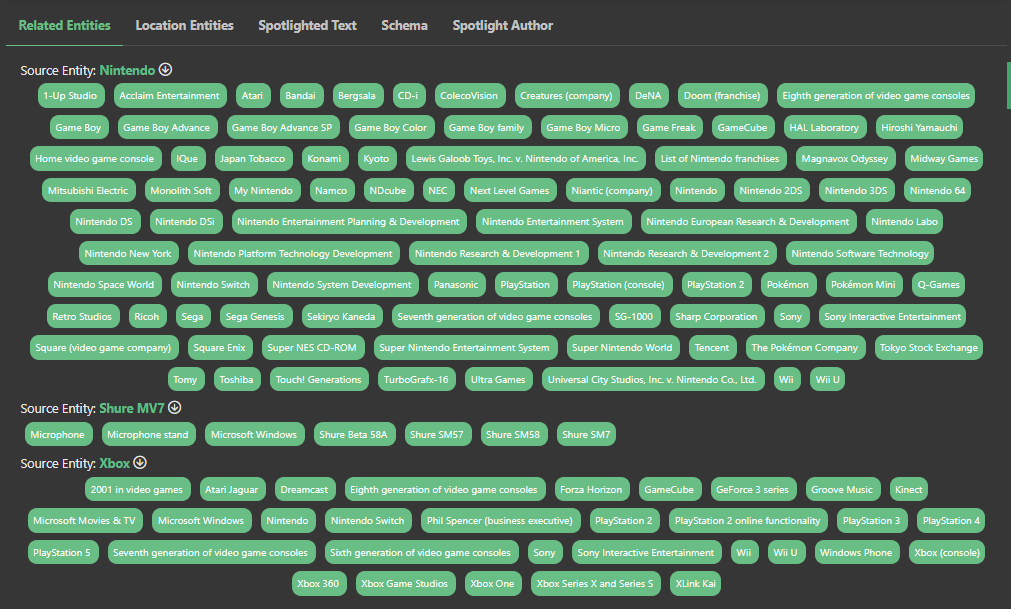
Incoming links and anchor text are also important factors in determining topical authority. Incoming links are links that point to a particular webpage from other websites, while anchor text is the visible, clickable text that is used to hyperlink to another webpage. By analyzing the incoming links and anchor text, Market Brew is able to determine which websites are considered authoritative on a particular topic, and how strongly they are associated with that topic.
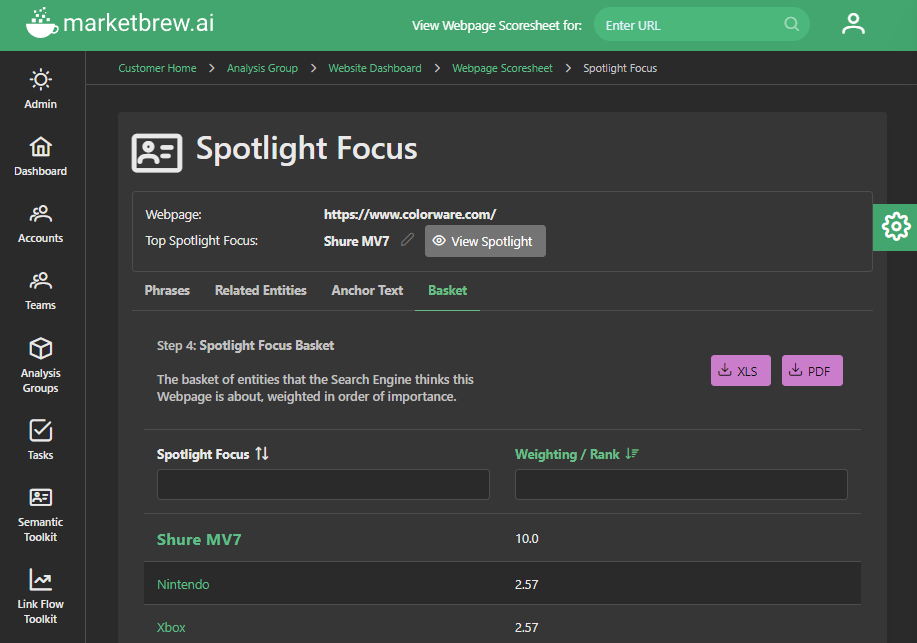
Overall, Market Brew's use of knowledge graphs, named entity extraction and disambiguation, and incoming links and anchor text allows them to model topical authority effectively, for both the user's site and their competitor sites.
This helps users to understand the relationships between different entities and topics, see their topic clusters, and to determine which websites are considered authoritative on a particular subject.
One of the modeled algorithms that are derived from this topical authority analysis is the "Expertise" Score (one of the E's in E-E-A-T) for each web page, which gives users the ability to know what additional expert information is missing from the web page content.
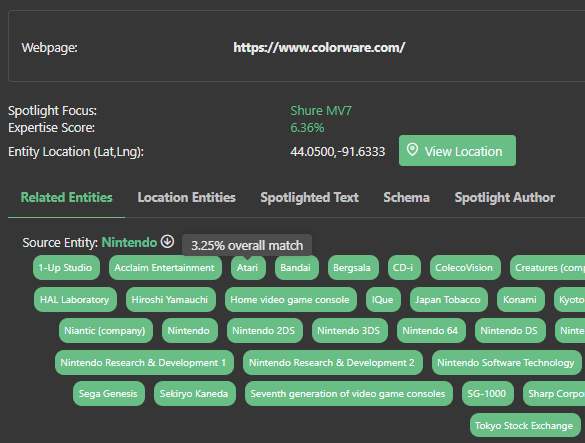
By using the "task by comparison" system, the outperforming sites in the topical authority algorithms can be viewed as a statistical goalpost for sites that are lacking in a particular topic.
Using a search engine model, Market Brew users can then write content to fill in the topical authority gaps between the target site and the outperforming site, and forecast the ranking impacts almost immediately.
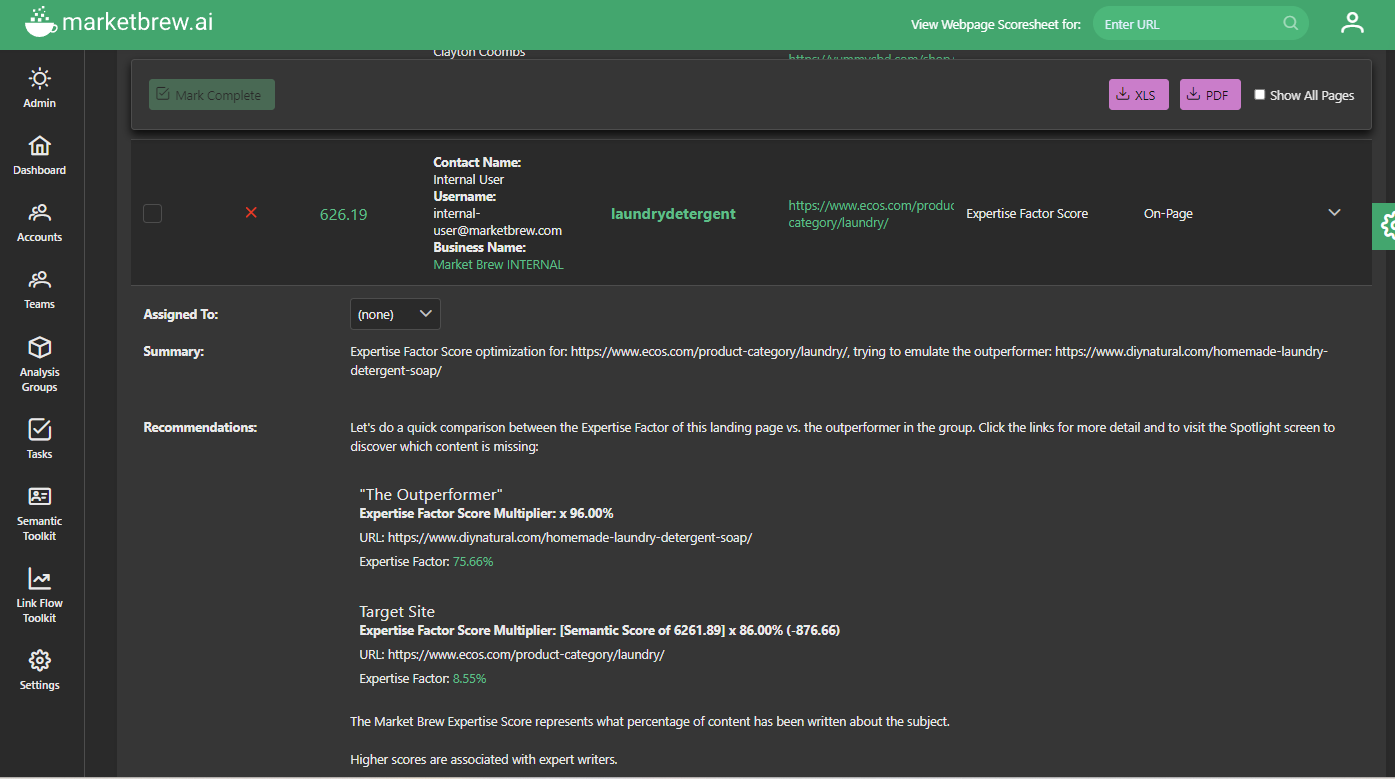
You may also like
Guides & Videos
Link Graph Leverage for SEO
Guides & Videos
Genetic Programming for SEO Content
Guides & Videos


